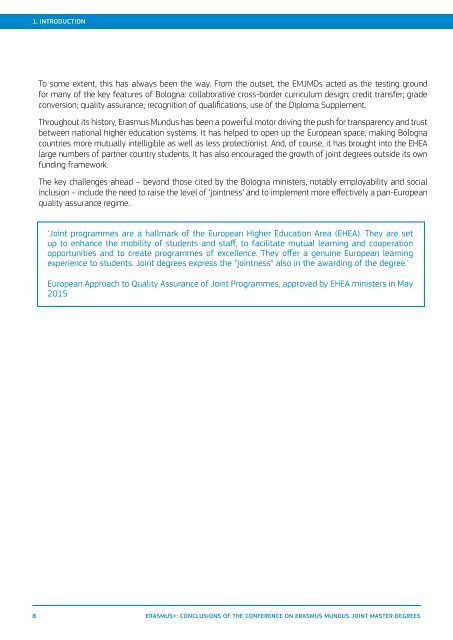Erasmus+
2kWLqbT
2kWLqbT
You also want an ePaper? Increase the reach of your titles
YUMPU automatically turns print PDFs into web optimized ePapers that Google loves.
1. INTRODUCTION 2. THE CONFERENCE TITLE<br />
2. THE CONFERENCE<br />
To some extent, this has always been the way. From the outset, the EMJMDs acted as the testing ground<br />
for many of the key features of Bologna: collaborative cross-border curriculum design; credit transfer; grade<br />
conversion; quality assurance; recognition of qualifications; use of the Diploma Supplement.<br />
Throughout its history, Erasmus Mundus has been a powerful motor driving the push for transparency and trust<br />
between national higher education systems. It has helped to open up the European space, making Bologna<br />
countries more mutually intelligible as well as less protectionist. And, of course, it has brought into the EHEA<br />
large numbers of partner country students. It has also encouraged the growth of joint degrees outside its own<br />
funding framework.<br />
The key challenges ahead – beyond those cited by the Bologna ministers, notably employability and social<br />
inclusion – include the need to raise the level of ‘jointness’ and to implement more effectively a pan-European<br />
quality assurance regime.<br />
‘Joint programmes are a hallmark of the European Higher Education Area (EHEA). They are set<br />
up to enhance the mobility of students and staff, to facilitate mutual learning and cooperation<br />
opportunities and to create programmes of excellence. They offer a genuine European learning<br />
experience to students. Joint degrees express the “jointness” also in the awarding of the degree.’<br />
European Approach to Quality Assurance of Joint Programmes, approved by EHEA ministers in May<br />
2015<br />
The purpose of ‘Mastering Joint Excellence under Erasmus Mundus’ was to bring together coordinators of the<br />
EMJMDs funded by the European Union and to facilitate their networking. Excellence, employability, ‘jointness’,<br />
quality assurance, the attractiveness of EHEA, and sustainability were high on the conference agenda.<br />
For more than a decade a considerable number of EMJMDs have been funded. The conference was an<br />
opportunity to look at their functioning and outcomes, but also to identify areas for improvement.<br />
Given the strong emphasis that the <strong>Erasmus+</strong> programme puts on the dissemination and exploitation of results,<br />
the aim was also to identify success stories and good practices, as well as challenges in the management of<br />
the EMJMDs, and to gather ideas about how the challenges have been met.<br />
Primarily, the conference set out to stimulate and intensify networking between the wide range of EMJMD<br />
representatives and other key actors. For two days, course coordinators mingled, conferred and compared<br />
experiences. They were drawn from two generations of programmes: those still launched between 2010<br />
and 2013 under Erasmus Mundus; and the EMJMDs which began in the framework of <strong>Erasmus+</strong> in 2014<br />
and 2015. At the time of the conference, all of the 165 courses were up and running, of which 106 were<br />
represented in the workshops.<br />
Joining the coordinators were chairs and rapporteurs from higher education institutions and sectoral bodies<br />
operating at European level, representatives from the national agencies in programme countries, as well as<br />
staff from the European Commission and the EACEA. In total, the participants numbered over two hundred.<br />
“It has been a very good experience to get to know other projects and ways of managing them. Is<br />
good to put a face to the person you establish a relationship with, via email”<br />
The conference adopted a participatory approach and was made up of a complementary mix of plenary sessions,<br />
workshops and ample opportunity for networking. Time and physical space were set aside for networking. It<br />
was important for participants to have the scope to discuss policy issues, problems and questions of detail,<br />
outside the formal sessions. The formal sessions themselves then benefitted from relationships already struck<br />
up and from the exchanges of experience.<br />
8 ERASMUS+: CONCLUSIONS OF THE CONFERENCE ON ERASMUS MUNDUS JOINT MASTER DEGREES<br />
ERASMUS+: CONCLUSIONS OF THE CONFERENCE ON ERASMUS MUNDUS JOINT MASTER DEGREES<br />
9


